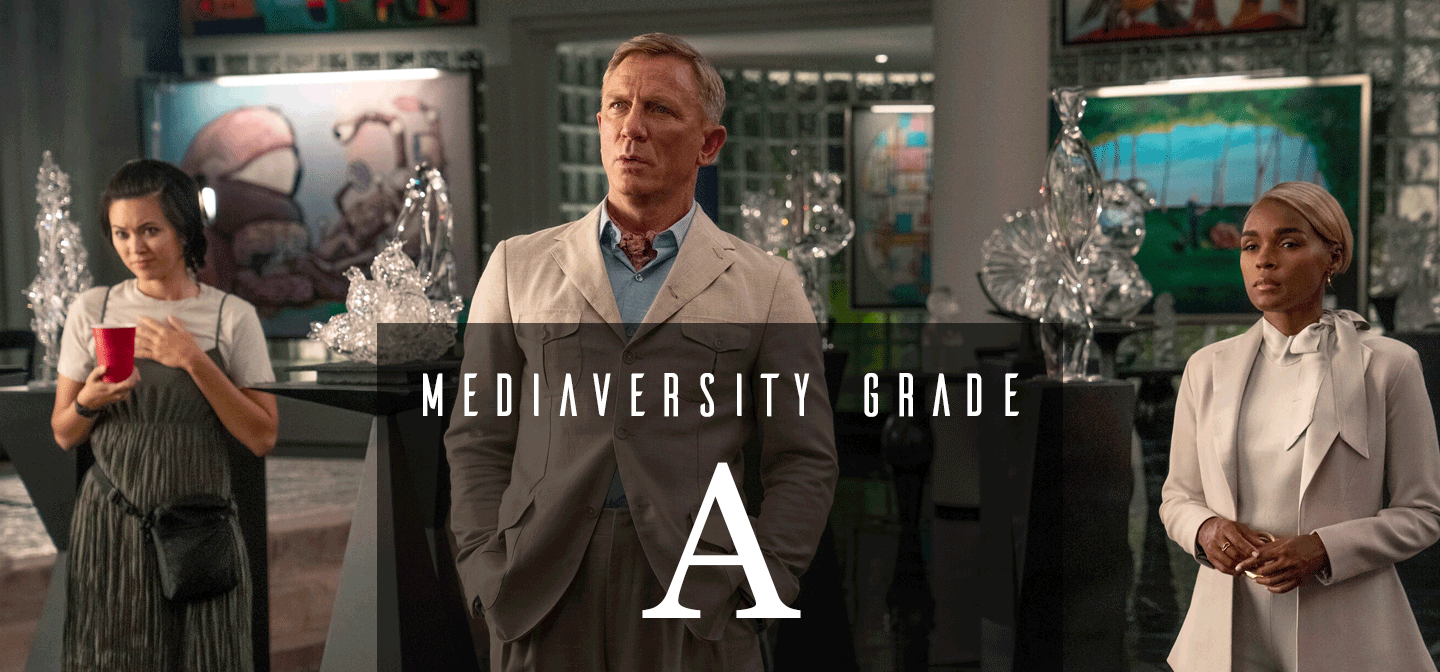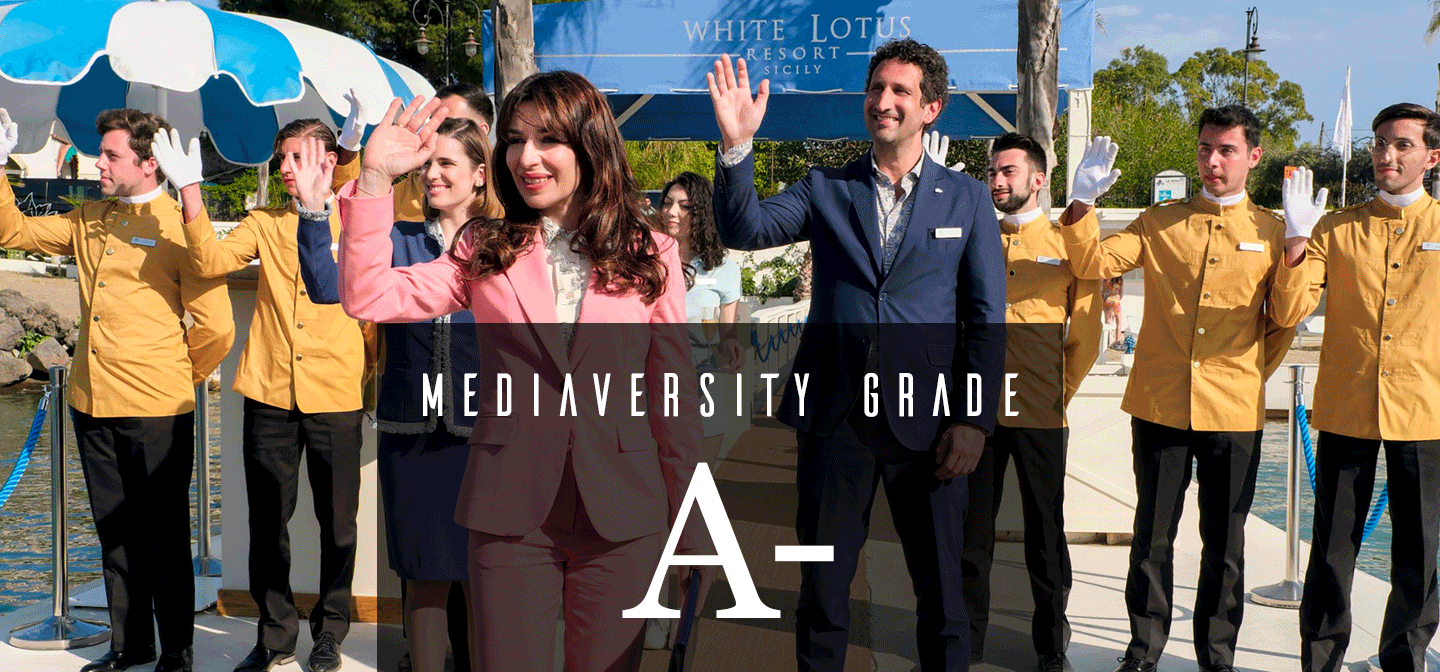Glass Onion: A Knives Out Mystery
“It’s great to see someone openly queer play a leading role in a popular, mainstream movie like Glass Onion: A Knives Out Mystery.”
Title: Glass Onion: A Knives Out Mystery (2022)
Director: Rian Johnson 👨🏼🇺🇸
Writer: Rian Johnson 👨🏼🇺🇸
Reviewed by Symphony Barnes 👩🏻🇺🇸
—MAJOR SPOILERS AHEAD—
Technical: 4.75/5
After the positive reception to his 2019 murder mystery, Knives Out, Rian Johnson began working on a hotly anticipated sequel that would once again follow detective Benoit Blanc (Daniel Craig).
Glass Onion: A Knives Out Mystery dazzles even more than the original, working on a bigger scale. The first film took place inside a Victorian house and focused on a dysfunctional family, but the second film roams over an entire island and follows an eclectic group of friends fashioned as topical archetypes. Knives Out critiqued old money with a focus on generational wealth, while Glass Onion shines its spotlight on new money, the billionaire class, and Big Tech.
But with this foray into excess, arrives my one minor quip with the film: The humor relies a bit too heavily on name-dropping and self-referential winks. In particular, fake brands like Jared Leto’s hard kombucha, or Jeremy Renner’s hot sauce, felt distracting rather than additive—especially given Leto’s many accusations of sexual assault and Renner’s own set of unsavory claims playing out in the public eye.
Still, Johnson’s latest creation feels fresh, sharp, and witty. Better yet, it doesn’t simply function as another straightforward take on the “eat the rich” narrative that has taken Hollywood by storm through recent films like Triangle of Sadness (2022) or The Menu (2022), or HBO Max’s The White Lotus. While it does incorporate that theme, it’s also a story of justice being served.
In addition to Glass Onion’s stellar writing comes its enticing score, eye-popping cinematography, and stunning performances. The cast shines as a whole, but it’s Craig as the charming detective, and Janelle Monaé (who gives a transformative take on hero Andi Brand) who make this sequel stand on its own merit.
Gender: 4.75/5
Does it pass the Bechdel Test? Yes
The men and women of Glass Onion reach equality numbers-wise, but it’s the women who receive more interesting backstories, more satisfying story arcs, and more enviable wardrobes to boot. And if we were to point out a “winner” of Glass Onion’s puzzle, it would be Monaé’s character.
It’s great to see them rise above one-dimensional stereotypes of rich heiresses and housewives. For example, Whiskey (Madelyn Cline) begins in a cliched relationship—the much-younger girlfriend of streamer and men’s rights activist Duke Cody (Dave Bautista). However, we later find out that she wants to get into politics, and that she’s fully aware of the misogyny she partakes in by publicly dating someone as problematic as Duke. Or take Kate Hudson’s Birdie Jay, a model turned fashion designer. While her attire may be the most immaculate of the entire cast, she’s not portrayed as a ruthless fashionista. Instead, she’s shown to be a very flawed human dealing with multiple issues that stem from her career.
Above all, it’s Monaé’s Andi who gets the lion’s share of Glass Onion’s character development. Similar to Knives Out’s Marta Cabrera (Ana de Armas), Andi is the good amidst the chaos; a moral compass among a group of self-serving narcissists. Her eventual triumph feels hard-earned not only for women, but for Black women in tech.
Race: 4.25/5
Andi is a Black woman who had her company stolen by a scheming, white male billionaire, Miles Bron (Edward Norton). In turn, she’s betrayed and gaslighted by her close friends, ousted from the company, and later murdered. She only receives support from her “friends” posthumously, and in a performative manner, when their backs are up against a wall.
Through this narrative, Johnson highlights important real-world problems. Miles ousting Andi reflects the history of white men taking credit for the work of Black women. In 2021, Henrietta Lacks’ estate sued a biotechnology company, accusing it of selling cells taken from the Black woman without her consent. White gay men regularly appropriate culture created by Black women. And the fact that Andi was easily discarded by people she thought were her friends mirrors the fact that Black women in the workplace are less likely to feel valued or treated fairly, according to a 2020 survey conducted by the Gallup Center on Black Voices.
On the one hand, it’s frustrating to see this injustice claim another Black woman, even a fictional one on screen. But thankfully, Andi’s twin sister Helen (also played by Monaé) achieves justice for Andi by the film’s end. In a memorable scene, upon discovering that Miles had murdered her sister, Helen goes into a cathartic rage and destroys Miles’ array of glass sculptures before causing an explosion that takes down the entire mansion in spectacular fashion. With detective Blanc at her side, Johnson could easily have fallen into the white savior trope, but Helen stands on her own and doesn’t need Blanc to avenge her sister.
In addition to Monaé, the cast also includes New York City-born Black actor Leslie Odom Jr. as scientist Lionel Toussaint. Jessica Henwick, whose mother is Chinese Singaporean of Teochew descent, takes the role of Peg, Birdie’s assistant. And Bautista, whose father is the son of Filipino immigrants, plays Duke. While none of their ethnicities play into the story, seeing complex characters of color who don’t feel tokenized is nice.
Bonus for LGBTQ: +0.50
Behind the lens, Monaé is nonbinary and uses they/them and her/she pronouns. It’s great to see someone openly queer play one of the leading roles in a mainstream movie seen by millions.
Within the film itself, LGBTQ representation narrows a bit but does exist. The reveal isn’t the clearest, but Glass Onion divulges that detective Blanc is gay. An early scene paints a small picture of the man’s life outside of work—a life that includes Hugh Grant checking in on Blanc while he is bathing. Johnson confirms the implications of such a scene, saying, “I felt like having Blanc be gay and have a partner just felt like a very natural thing coming out of the first movie.” He goes on to add how he didn’t mean to skirt the subject of queerness, but that good murder mysteries seldom dive into detectives’ personal lives. Luckily, he recognizes that “it’s a big part of who [Blanc] is, and going forward, it’s going to be fun to learn more about that.”
In addition, it’s cool to read about Monaé’s reaction to seeing Blanc’s same-sex partner in Glass Onion. They say, “Rian showed it to me and I was just like, ‘Oh, I love it! I mean, I’m queer nonbinary as you know … so it was just great to have that representation and not be like a big thing. It’s like, super normal, casual cool, as it should be.”
Bonus for Disability: +0.25
While it might fly under the radar of disability representation, Glass Onion combats the usual depictions of people with food allergies. Duke’s severe allergy to pineapple becomes an important detail in the story, without turning it into a punchline. Far from being the usual nerdy character, Duke is a brawny men's rights activist, showing that allergies don’t discriminate.
Mediaversity Grade: A 4.83/5
Glass Onion is just as great as its predecessor, if not better. Laudably, it continues the trend of following a woman of color as its core protagonist, making for a satisfying watch. I’m already excited for the next film to come.




